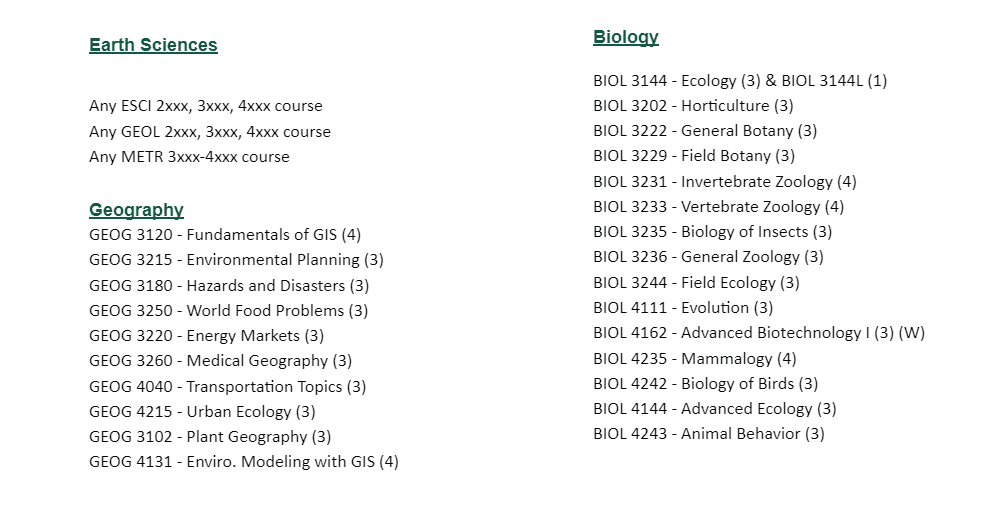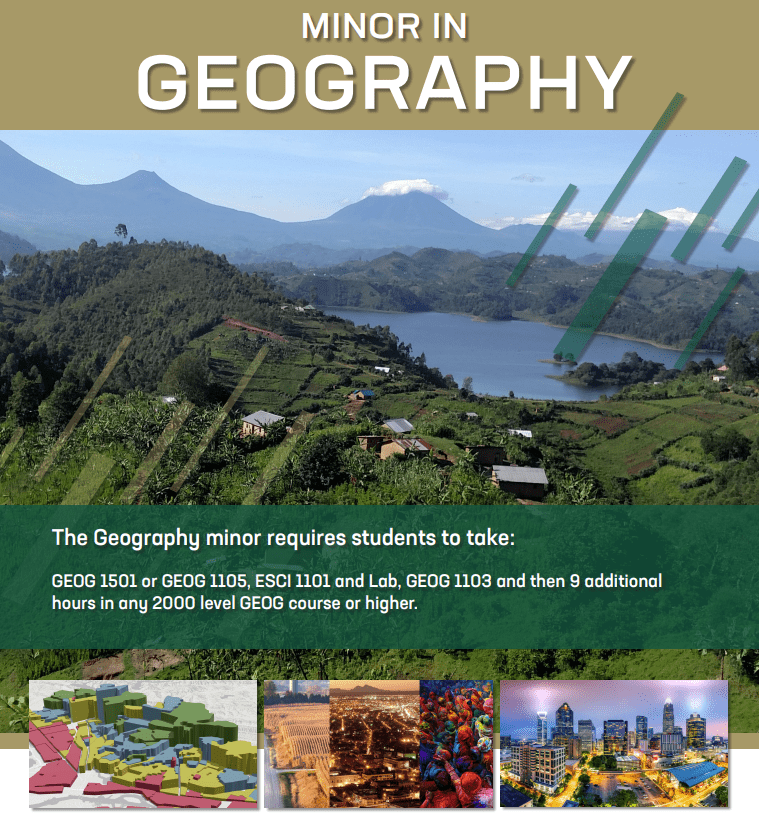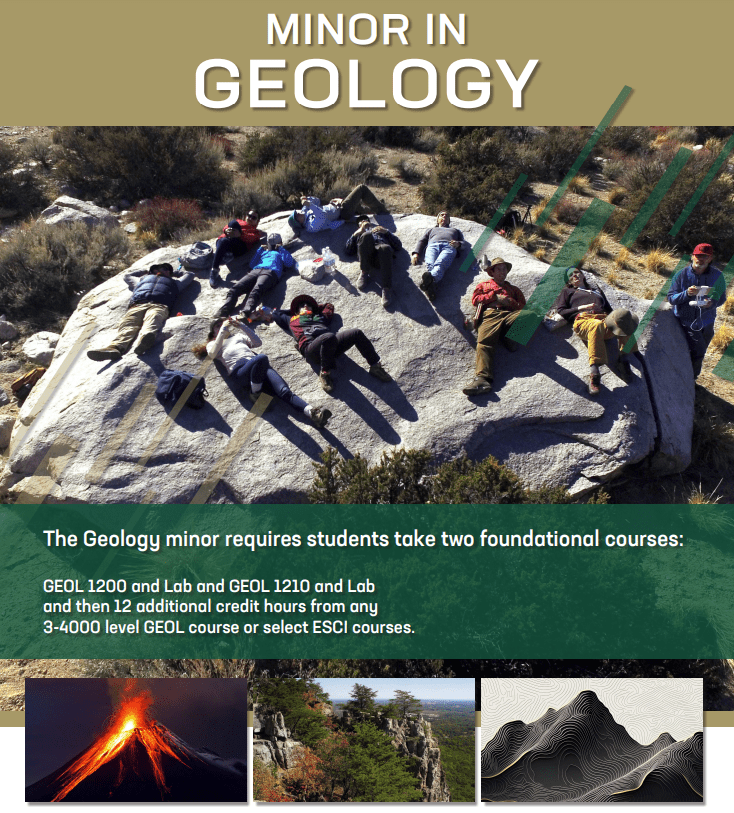Minors in Geography, Earth and Environmental Sciences, Geology, and Urban Studies
Geography | Earth and Environmental Sciences | Geology | Urban Studies
To obtain a Minor in Geography, students must complete 22 credit hours offered from the Department of Earth, Environmental and Geographical Sciences. Participating students have flexibility in choosing elective courses that reflect their specific area of interest. The Minor in Geography can be tailored to support a number of majors, such as: architecture, business, computer science, engineering, and political science.
Foundational Courses (11 hours)
- GEOG 1501 Global Geography OR GEOG 1105 Human Geography (3 hours)
- ESCI 1101 Intro to Physical Geography and Lab (4 hours)
- GEOG 1103 Spatial Thinking (4 hours)
Elective Courses (9 hours)
- Any GEOG 2xxx, 3xxx, or 4xxx course (9 hours)
Questions about the Geography Minor? Please contact Dr. Larianne Collins for more information: lcolli36@charlotte.edu
To declare a minor in Geography, click here.
Earth and Environmental Sciences Minor – (22 Credit hours)
To obtain a Minor in Earth and Environmental Sciences, students must complete 22 credit hours offered from the Department of Earth, Environmental and Geographical Sciences and the Department of Biological Sciences. Participating students have flexibility in choosing elective courses that reflect their specific area of interest within the environmental field.
NOTE: If students are majoring in the departments of Geography and Earth Sciences or Biological Sciences, they must take at least 12 credits outside of their major subject area (that is, outside of BIOL, ESCI, GEOG, GEOL, or METR, depending on the student’s major).
Students may not double count major required or elective major courses and the 12 credits of minor elective courses. However, students may double-count up to 10 credits of Foundational Courses toward the minor if taken for both their major and the Earth and Environmental Sciences minor. Students may not double-count courses between this minor and another minor.
Questions about the Earth and Environmental Sciences Minor? Please contact: Dr. Valerie Reynolds vreynol2@charlotte.edu or Terry Shirley, trshirle@charlotte.edu
To declare a minor in Earth and Environmental Sciences, click here.
Below is a an outline of the requirements for an Earth and Environmental Sciences Minor
Foundational Courses (10 hours)
- ESCI 1101 Intro to Physical Geography and Lab (4 hours)
- ESCI 1501 Environment, Society, and Sustainability (3 hours)
- ESCI 2222 – Environmental Science (3 hours)
Elective Courses (12 hours)

To obtain a Minor in Geology, students must complete 20 credit hours of Geology courses offered from the Department of Earth, Environmental, and Geographical Sciences. Students have flexibility in choosing elective courses that reflect their specific area of interest. The minor can be tailored to support a number of majors, such as: engineering, biology, chemistry, or physics.
Note: At most 8 credits can be double-counted between the geology minor and a major in Earth and Environmental Sciences, Environmental Studies, Geography, or Meteorology. Students may not double-count courses between this minor and another minor.
Foundational Courses (8 hours)
- GEOL 1200 and Lab, Intro to Physical Geology (4 hours)
- GEOL 1210 and Lab, Earth History (4 hours)
Elective Courses (12 hours)
- Any GEOL 3xxx, or 4xxx course
- or students may take any combination of the following ESCI courses:
- ESCI 3105 Oceanography (3 hours)
- ESCI 4210 Soil Science (4 hours)
- ESCI 3310 National Parks (3 hours)
The Geology Minor Counts Toward Geology Licensure
For students interested in geology licensure, an additional 10 credits of advanced geology coursework beyond the minor will meet the licensure requirements, preparing students to take the ASBOG® Fundamentals of Geology (FG) exam. Students who pass the ASBOG® FG exam are awarded the Geologist-in-Training (GIT) certification. GIT certification can bolster the resumes of graduates entering the workforce and demonstrate to your potential employer that you are competent, proactive, and on the path to advance to full licensure.Visit the North Carolina Board for Licensing Geologists to learn more.
Which UNC Charlotte courses count toward professional licensure?
Questions about the Geology Minor? Please contact Dr. Valerie Reynolds: vreynol2@charlotte.edu
To declare a minor in Geology, click here.
minor in Urban Studies

Spring 2026 Urban Studies Course Offerings can be downloaded below:
To add the Urban Studies Minor, please fill out the Change of Minor Form located on the GES website.
What is the Urban Studies Minor?
The Urban Studies Minor is an 18-credit-hour interdisciplinary program focused on the exploration of cities and urban processes through an array of disciplinary lenses. The program prepares students to better understand the complex challenges presented by urbanization and the rapid pace of change in 21st-century cities. The Urban Studies Minor positions students to be able to effectively address these challenges as both professionals and citizens.
Minor Requirements
A Minor in Urban Studies requires the completion of 18 credit hours. All students in the Minor are required to take Introduction to Urban Studies as a foundational course.
Required Courses (3 credit hours)
URBS 2200/GEOG 2200 – Introduction to Urban Studies (3)
The remaining 15 credit hours may be selected from the following course options:
Elective Courses (15 credit hours)
| AFRS 3280 – Blacks in Urban America (3) *or* HIST 3280 – Blacks in Urban America (3) | GEOG 3205 – City Regions and Systems (3) |
| ANTH 2125 – Urban Anthropology (3) | GEOG 4200 – Environmental Justice, Injustice, and Planning (3) |
| ARCH 4201 – Architectural History I: Prehistory-1750 (3) (permission of instructor required) | GEOG 4209 – Small Town and Community Planning (3) |
| ECON 4150 – Urban and Regional Economics (3) | GEOG 4210 – Urban Planning Methods (3) |
| GEOG 1110 – Introduction to Urban and Regional Planning (3) | GEOG 4215 – Urban Ecology (3 |
| GEOG 2111 – Social Inequality and Planning (3) | GEOG 4220 – Housing Policy and Planning (3) |
| GEOG 2165 – Patterns of World Urbanization (3) | GEOG 4310 – Urban Social Geography (3) |
| GEOG 3100 – Geography of Cities (3) | GEOG 4315 – The Urban Form (3) |
| GEOG 3106 – Sustainable Cities (3) | HIST 3281 – American Cities (3) |
| GEOG 3110 – Urban Political Geography (3) | POLS 3121 – Urban Politics and Policy (3) *or* GEOG 3110 – Urban Political Geography (3) |
| GEOG 3115 – Urban Transportation Problems (3) | SOCY 3325 – Community and Identity (3) |
| GEOG 3200 – Land Use Planning (3) | SOCY 4125 – Urban Sociology (3) |
| GEOG 3210 – Regional Planning (3) | URBS 3050 – Topics in Urban Studies (3) |
Additional Course Options
With prior permission from the Urban Studies Minor Coordinator, students may also select from:
URBS 3801 – Independent Study in Urban Studies (1 to 3)
URBS 4401 – Internship in Urban Studies (3)
Students may also count up to nine (9) credit hours of other courses that have a significant urban focus with the prior permission of the Urban Studies Minor Coordinator (Dr. Katherine Idziorek, kidziorek@charlotte.edu).
Of their total 18 credit hours, students are expected to take no more than 6 credit hours of coursework in any one disciplinary area.
What can the Urban Studies Minor do for you?
- Prepares students for careers in the public, private and non-profit sectors.
A minor in urban studies provides an excellent foundation for students interested in pursuing careers such as architecture, land use or community planning, law, public policy and administration, education, law enforcement, community organizing, transportation, housing and commercial development, real estate, political service, social work, journalism and research. - Broadens students’ range of analytical tools.
Students who minor in urban studies will have the opportunity to explore cities through multiple lenses of analysis. A course in architecture exposes students to an urban design perspective; a course in urban politics engages the student in questions of public policy and public service provision, and courses in geography address issues of urban planning and spatial analysis. Courses in history provide temporal context and historical insight while courses in sociology and anthropology introduce students to the social dynamics and cultural complexity of urban life. - Facilitates exposure to both traditional academic and applied analysis.
Coursework in urban history, sociology and anthropology introduces students to theory development and evaluation while also building skills of critical thinking and analysis. Coursework in architecture, politics and geography additionally emphasizes the ways in which urban practitioners identify and work to solve urban problems and challenges. - Enables students to become both generalists and specialists.
A major in history or anthropology or sociology, for example, provides students with a broad-based social science liberal arts degree, while a minor in urban studies allows further specialization in cities. - Deepens students’ appreciation and understanding of urban problems and promise.
Housing, homelessness, sustainable development, urban design, architecture, transportation, poverty, urban health, crime, local government, architectural history, urban sprawl, race relations, urban history, economic restructuring, urban revitalization, and growth management are examples of issues explored in the courses offered within the Urban Studies Minor. - Prepares students for both professional and civic roles in the improvement of the quality of urban life.
The interdisciplinary focus of the Urban Studies Minor prepares students to better understand, and to be able to effectively address – as both professionals and citizens – the many challenges presented by the rapid pace of urban change in the 21st century.
Questions?
If you have questions, or if you are interested in enrolling in the Urban Studies Minor, please contact Dr. Katherine Idziorek, Urban Studies Minor Director
Email: kidziorek@charlotte.edu
Office: McEniry 311


